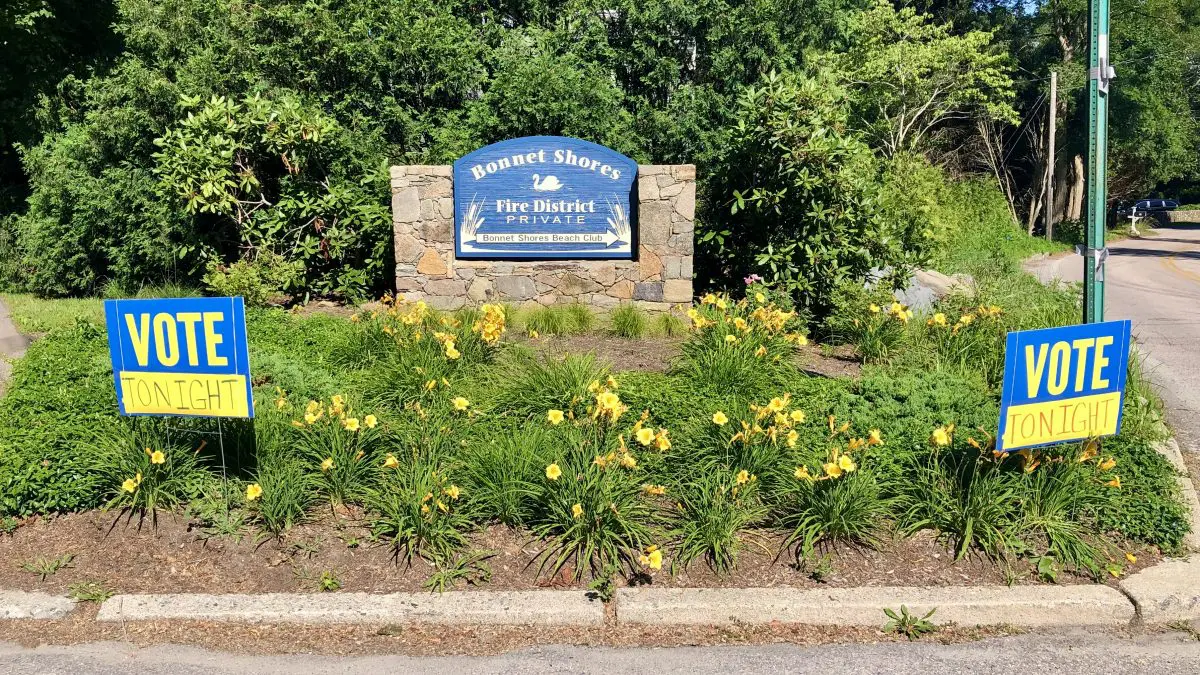Judge rules residents need not own property to vote in Bonnet Shores Fire District
Last June UpriseRI covered the Bonnet Shores Fire District (BSFD) election night, an arcane, tradition-filled affair that disqualified Narragansett residents that don’t own property from voting. The BSFD election even disqualified people who do own property but whose names are not on the deed, such as Melissa Jenkins, who co-owns a house in the district with her spouse.
EDITOR'S NOTE: Charlestown has two fake fire districts, Shady Harbor and Quonochontaug Central Beach. These are home owner associations in disguise because they do not have the capacity to fight fires and serve mostly as a tax dodge. - Will Collette
During
an election to fill 14 open positions in the Bonnet Shores government, Jenkins
was forced to watch the proceedings. Jenkins’ right to vote was not only
ignored, she also suffered insults from candidate Robert Anderson, who
called her ignorant and a liar.
In
Rhode Island, one would think that the idea of owning property to ensure
suffrage would be anathema given the historic importance of the Dorr Rebellion which
dealt with the very issue of a democracy owned by a small cadre of rich elite
property owners and opened up the franchise to more people (while, it should be
said, still ignoring the rights of Black, Indigenous and women voters.)
Aside from preventing resident non-property owners from voting, the BSFD also allows votes from non-residents. As the ACLU of Rhode Island explained in their brief, “…the 4,948 joint owners of the 930 ‘cabanas’ and ‘bathhouses’ of the Bonnet Shores Beach Club [BSFD] each have a vote, regardless of how many times — if any — they visit BSFD during the year.
These owners may be individuals, realty companies, limited liability companies, family trusts, or any other “person” as broadly defined in law. Thus, many for-profit commercial enterprises have a greater say in who is setting local property taxes and traffic rules than those who live in BSFD and are subject to those ordinances. These ‘cabanas’ are not residences with many not being large enough to meet minimum housing requirements.”
During
the vote in June, these beach club renters and owners didn’t even have to show
up. They gave their proxy vote to beach club owners. This allows the beach club
to overwhelm the election since there are 800 homes in the BSFD, and over 4000
commercially deeded beach closet owners. Actual residents don’t stand a chance.
On
Thursday Rhode Island Superior Court Judge Sarah Taft-Carter “ruled
unconstitutional a policy of the Bonnet Shores Fire District in Narragansett
that bars residents from voting if they own less than $400 of property in the
district.”
“The
Court cannot conceive of any circumstances in which the BSFD could permissibly
use the property ownership requirement to prevent otherwise qualified residents
from voting in BSFD elections,” said Judge Taft-Carter. “Given the undisputed
facts of this case, the unavoidable conclusion is that the BSFD Charter’s
denial of district residents’ right to vote on the basis of property ownership
is unconstitutional.”
From
the ACLU press release:
“In
rejecting the BSFD’s argument that it exercised only ‘narrow’ powers for a
beach community to justify its denial of voting rights to some residents, Judge
Taft-Carter noted that there was ‘no genuine issue of dispute that the BFSD
actively exercises governmental powers that make BSFD elections matters of
general interest to all residents.’ Taft-Carter cited the District’s various
taxing powers, provision of sanitation services, and enactment of ordinances
governing such activities as parking, loitering and consuming alcoholic
beverages in public that included monetary fines. Among those excluded from
voting were individuals who rent property in the district and spouses or adult
children of title holders.“
The
court’s ruling was only a partial victory. The court held “that more evidence
was needed before she could decide a second claim of the plaintiffs – that
allowing non-resident property owners to vote unconstitutionally diluted the
voting rights of residents.”
The
ACLU said it planned to review the charters of other fire districts in the
state and consider taking legal action against those that imposed similar
voting restrictions on non-property-owning residents.
